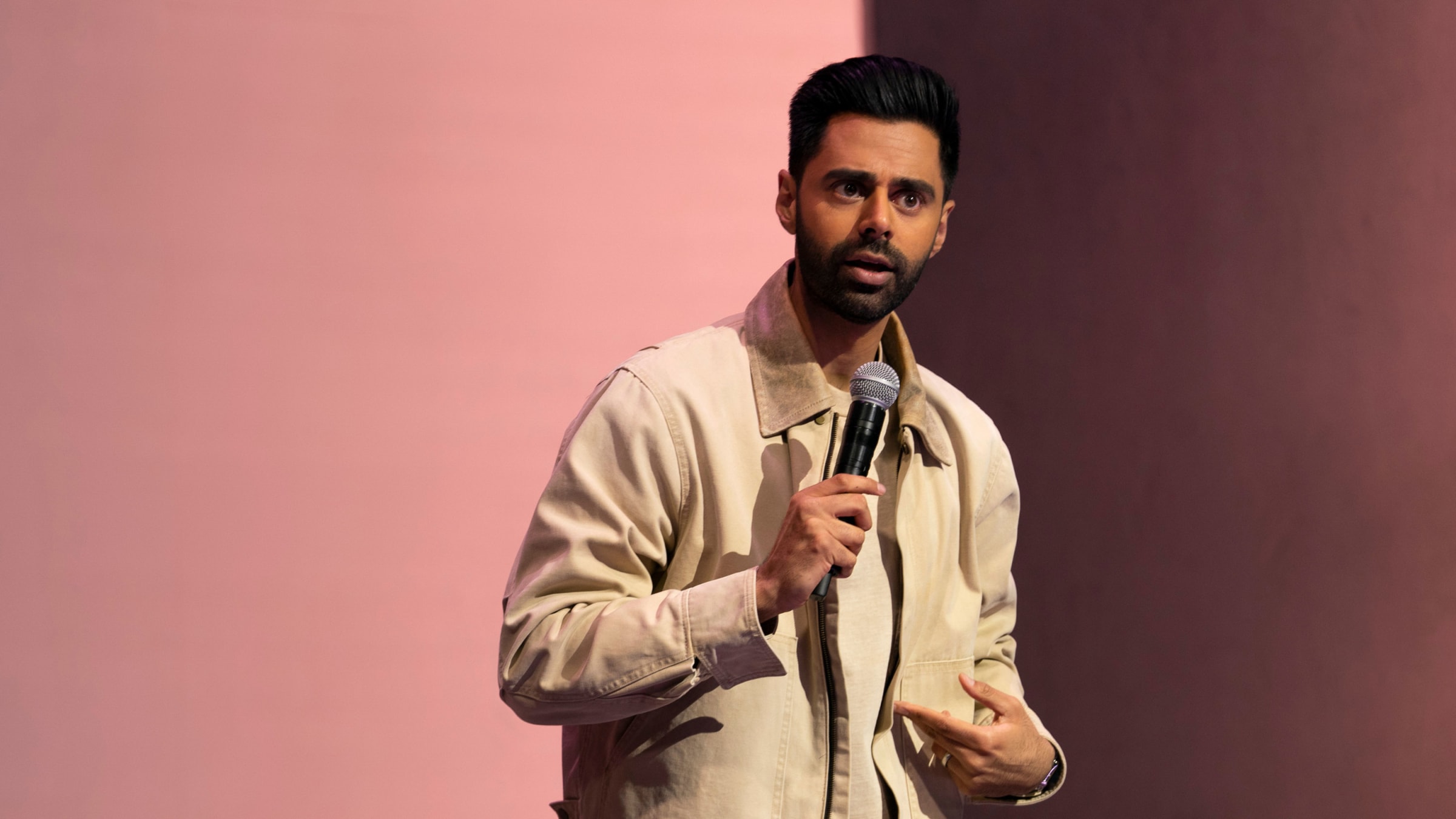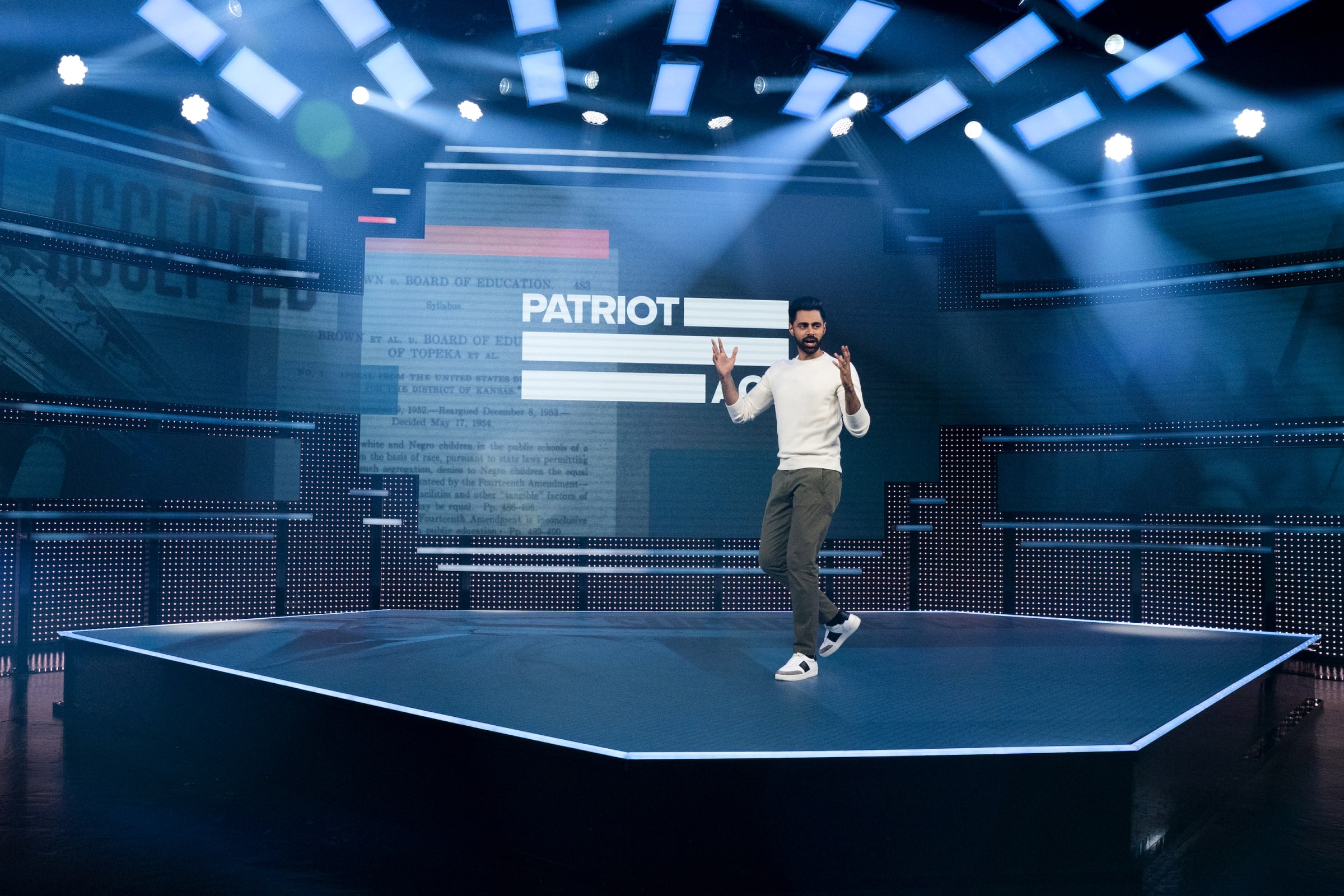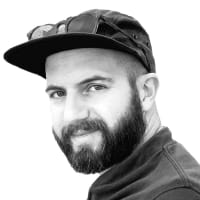Hasan Minhaj: ‘I Did the Right Thing for the Wrong Reasons’

Clifton Prescod/Netflix
The former “Daily Show” correspondent and “Patriot Act” host opens up about the mistakes he’s made and attempts to reckon with them in his new Netflix special “The King’s Jester.”
Hasan Minhaj has had a very busy five years between the release of his first big stand-up special, Homecoming King, in 2017 and the premiere this week of his new hour, The King’s Jester, on Netflix. The former Daily Show correspondent roasted Donald Trump in absentia at the White House Correspondents’ Dinner, launched and ended his weekly Netflix series Patriot Act, and found himself in the crosshairs of the Saudis for his unflinching criticism of the crown prince, Mohammed bin Salman.
All of it and more form the heart of his new special, which Minhaj discusses at length in this episode of The Last Laugh podcast. The comedian also opens up about the moment he realized he may have crossed a line with his comedy, reveals an elaborate prank he pitched to Nathan Fielder, addresses the accusations of a toxic work environment at Patriot Act, and a lot more.
If Homecoming King was about introducing not only himself but the very idea of “new Brown America” to the world, The King’s Jester is an “interrogation of why I believe what I believe,” Minhaj explains. It traces his rapid rise in the comedy world from the moment he started accruing cultural power as host of Patriot Act through the controversy that led Netflix to remove that show’s premiere episode from the platform in Saudi Arabia and beyond.
“I’m surprised we lasted as long as we did,” Minhaj says now of the show, which streamed 40 episodes in less than two years before its ultimate cancellation. And while there are a lot of “wild conspiracy theories” that Netflix axed Patriot Act because of the Saudi blowback—or even because he made jokes at the company’s expense—Minhaj insists that it simply came down to a lack of “growth” in the streaming numbers.
Just after we talked, Trevor Noah announced that he would be stepping down as host of The Daily Show, reigniting speculation about who might take over as host of the Comedy Central series. “I don’t think I was on the list,” Minhaj says of the 2015 search to replace Jon Stewart, echoing more pointed comments that former Daily Show correspondent Samantha Bee made to me a few years ago. When I remark that his absence from that replacement conversation was “surprising,” Minhaj replies, “I know. It was something that I would have wanted.”
“But as corny as it sounds, destiny has a way of working itself out,” he adds, “and things lined up the way they were supposed to line up.”
Below is an edited excerpt from our conversation. You can listen to the whole thing by subscribing to The Last Laugh on Apple Podcasts, Spotify, Google, Stitcher, Amazon Music, or wherever you get your podcasts, and be the first to hear new episodes when they are released every Tuesday.
Let’s talk about the Saudi Arabia stuff, because it is such a big part of the special. You also reveal in the special for the first time that you actually were trying to interview the crown prince, Mohammed bin Salman. Was the idea that it would be part of that first episode of Patriot Act?
Yeah, we were trying to shoot an interview with the crown prince while he was doing his charm offensive. He was doing a media campaign where he met with The Rock, and he met with Michael Bloomberg at Starbucks and Ari Emmanuel and WME, and it was this whole “the crown prince has arrived in America” tour. And I thought this could be the moment to say, “Hey, I’ll meet you, let me shoot my shot.” I felt like there is a perspective that I would have that perhaps Dwayne “The Rock” Johnson does not have that would make that interview interesting.
How do you think you would have approached it? What would your goals have been?
I mean, I think certainly there’s a dual energy that Muslims around the world feel when it comes to their relationship with Saudi Arabia. On one hand, they are the custodians of one of the holiest sites in our faith. Mecca and Medina are in Saudi Arabia and it is the duty of every practicing Muslim to try to make their pilgrimage there. It’s a very sacred place in our hearts and in our faith. And at the same time, there is this quite contentious relationship with the Gulf States vis-à-vis the proxy wars they’ve had with Yemen and some of the political alliances they’ve had. And so my identity both as a Muslim and as American is very complicated with the Saudis, and America’s relationship is very complicated with the Saudis. America will always say we will fight and support democracy around the world, and then every couple of years, every president will go sword dancing with the Saudis. You go full Prince Ali Ababwa to lower the gas prices and sell some arms. So those would have my comedic takes that I brought to the interview.
How do you feel about the episode now that it’s been a few years? It obviously got taken down from Netflix in Saudi Arabia and there was a lot of controversy and discussion around that. Is there anything you would do differently, or do you feel like you stand by everything in that episode?
I’m super-proud of what we said. But one of the things I touch on in the special is, I’m not proud of the means by which I went about it, and some of the haughtiness and the ego that I had to just bum-rush an embassy and put myself and my loved ones in danger. And the kind of drunken high and stupor that I had to try to get the great joke. That shit isn’t funny, man. You could get a lot of people hurt.
Funny enough, I’ll tell you a story. Even after it happened and the episode got taken down and my Hajj visa was denied, I had this idea where, in Islam, if you can’t make your pilgrimage, somebody can make it on your behalf. So God has created this little loophole. So I said, how can we make a sketch out of this? I feel like this would be kind of the ultimate long con. So I called Nathan Fielder, and I go, “Nate, have you ever considered Islam? I know you love reporting from the field. What if you converted to Islam? You know, Muslims and Jews, we are cousins, we both come from Abraham, let’s just do this. You go down. You make your pilgrimage on my behalf. We come back and, you know, maybe we go on CBS Sunday Morning and let the Saudis know, ‘Hey, no autocratic power can inhibit my connection to God.’” I remember Nate said something that was so chilling now that I think about it. He goes, “Could this get me hurt?” And Matt, he meant it sincerely.

“Patriot Act with Hasan Minhaj.”
Cara Howe/Netflix
Like physically hurt?
Yeah. “Would this get me hurt? Would they kill me?” He’s like, “Dude, I don’t know. I think the idea is brilliant. I think it’s so funny. But…”
He’s a pretty daring guy in a lot of ways.
Yeah, but this isn’t, “I’m gonna create a restaurant called Dumb Starbucks.” This is, “I’m gonna fly to Saudi Arabia and pull this off with cameras.” There is a delta of danger here that a lot of Americans don’t know. Safety is assumed in the States.
Well, you found Nathan Fielder’s line.
But also, now that I think back on it, the fact that I was willing to put that on paper in a pitch sheet, call him, try to get a crew. Man, I’m so glad we didn’t go through with it. But I’m also kind of ashamed at myself that to pursue comedy and to pursue a bit, I’d be willing to put myself and another person’s life in danger. That’s not cool, man. And that’s something I explore in the special.
I mean, that really is the heart of the special in a lot of ways: the fallout from your pursuit of dictators, and how it affected your own personal life. The irony of the whole thing is that this episode that got taken down in Saudi Arabia brought you more fame, more attention, more social media clout than anything else you’ve ever done.
Real talk, man, the ugly thing that I wrote down while we were just fleshing out the story is, “I did the right thing for the wrong reasons.” And TIME 100 and blue-check Twitter doesn’t know that. But [my wife] Beena knows that, and I know that. One of the things in my belief system is checking your intention. Intention is really big in Islam. And my intention wasn’t in the right place. I had spent all these years at The Daily Show and you know when something is going to connect. I had enough experience as a comic to be like, I know what this is gonna do. And that’s fine, you can do that, but for me, I want to be really pure in that intention and be like, “I would do this whether there are cameras here or not.” That’s why I included that line in the special that Beena did say to me. She goes, “I love how you only care about these issues when there's a camera on you.” And I was like, “I know, right?” It’s a very ugly thing. It’s not a thing I’m proud of. But it was a theme that I wanted to explore, and it started with that question: Can you do the right thing for the wrong reasons?
Do you feel like you have gotten to that point where you can separate yourself from the reward system of social media and all of that?
I had this line that we removed from the special, but it was, I’m trying to close the gap between who I am on Instagram and who I am on iMessage. Best believe there’s Twitter Matt Wilstein and there’s iMessage Matt Wilstein. There’s Twitter Amanda Gorman and there’s iMessage Amanda Gorman. There’s Twitter Malala and there’s iMessage—or WhatsApp—Malala. And those are two different people. You’re lying to me if you don’t admit that, because I know that’s true with me. And if I’m going to be honest and pursue this thing called being an artist and devote my life to it, I’ve got to give you iMessage me. And iMessage means, this is who I really am, for real, for real. “What did you really think of Olivia Wilde’s movie, for real?” That’s the iMessage me. That, to me, is true honesty, and that’s what I’m pursuing.
The second part of it is what Beena said, which is, if you really believe this, you would do it whether or not people can see it. There is so much social signaling and shaming of who a good person is and who a bad person is. But to me, the only people that get to really determine that are my family. And so I also now, as a comedian, have to check that against them. Because that’s how I determine whether or not I’m doing the right thing for the right reasons.
In the spirit of being honest about this public versus private stuff, one thing that I’m sure you’re aware of around Patriot Act is that there were some staffers who spoke out about a toxic work environment. And it was mostly women of color. I do want to give you the space to respond to that, because I haven’t heard you talk about that anywhere and it kind of falls in line with this conversation that we’re having.
Totally. So a couple of the staffers did not have a good experience with a couple of their coworkers in their departments. It was specifically in regards to the tone, posture, and demeanor that those folks in their department had. And, if you remember, during that period of time [in the summer of 2020] several newsrooms were having these conversations.
Yeah, it was a big moment of reckoning.
From The New York Times to the Washington Post to Buzzfeed, there were people that felt, “Hey, I’m not being heard, my pitches aren’t being heard. Why are these ideas being heard over mine?” And one of the things that I really learned as a leader, I had to step back and go, “Oh, man, I really wish people in those teams would have gotten along.” The thing I have to own as a leader is, whether or not you’re in those rooms, you have to set a precedent or agenda to go, “Hey, the way I’m carrying myself, everybody’s got to carry themselves that way too.” And that’s the thing I’ve reflected on, too, as I’ve gotten into other projects and now been on other sets, is going, how can I ensure that everybody feels heard even when I’m not there?
Ultimately, there were some pretty scary consequences for you and your family that stemmed from the comedy you were doing, and you talk about that in this very emotional way in the special. Was there a breaking point for you where you really had to re-examine what you were doing?
Yeah, when my family received that package, and I don’t know who sent it, and I was with my daughter. That was just a sobering wake-up call.
It was an envelope with some white powder that fortunately did not turn out to be anything dangerous.
Thankfully. So someone was trying to scare me or scare us. And it worked. It was really terrifying. There really is this thing where people talk about, “Oh, comedians need to push the envelope.” But I remember in that moment going, oh shit, sometimes the envelope pushes back.
There are consequences for what you say and do. And if it hurts the people that count on you the most, and someone who is so innocent like my daughter, I’ve really got to reevaluate and examine what I’m doing here.
Did you ever consider quitting comedy altogether or changing the type of comedy that you do?
Certainly the latter. It was, how do I engage in this thing that requires that? Because comedy as an art form inherently needs to be cutting, irreverent. It, by design, is poking at something. So then I had to ask, who am I poking? What am I poking? And I think this not only applies to me, but it applies to the art form itself. As comedians, we have to figure out the Overton window of what is appropriate discourse when it comes to jokes. But rather than applying that to other people, the show’s really about me applying it to myself. And the conclusion I came to is, I’m willing to take a joke as far as I possibly can. Best believe, I’m going to swing—up until the point that I believe in my heart this is going to hurt loved ones and family members. Sorry, I opt out.
And before, you would have done it anyway, just went for it?
It would have been a dream, man. I would have gone full international Desi espionage Borat. Put me in a wig, let me run into an embassy, I’ll do whatever it takes. And it’s crazy, man, I’m 37 and I started doing comedy when I was 18. I got hired to join The Daily Show when I was 30. And I’m sure you’ve talked to so many comics—between 18 and 30, that window was so dark, you are so desperate for health insurance and security in any capacity, the only thing that gives you wind in your sails is that next joke. You’re willing to do anything to get that big laugh. And there is more to my life than comedy now. I’ve got an amazing wife and two beautiful kids. I’m lucky that both my parents are still alive too. I can’t sacrifice that for a great bit.
Listen to the episode now and subscribe to ‘The Last Laugh’ on Apple Podcasts, Spotify, Google, Stitcher, Amazon Music, or wherever you get your podcasts, and be the first to hear new episodes when they are released every Tuesday.
